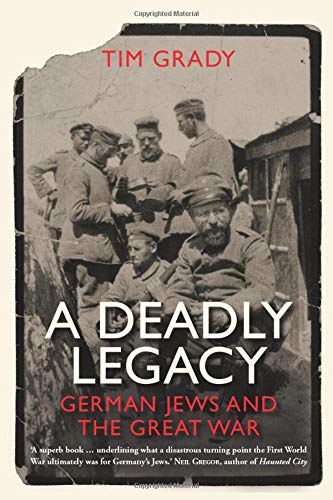Grady, Tim. A Deadly Legacy: German Jews and the Great War. New Haven: Yale University Press, 2017.
The history of the Jewish people in the Second World War is so central and well-known that I don’t need to reflect any more upon it here. The road to those horrific events has also received much coverage by historians in recent years, demonstrating how the Holocaust was not a spontaneous event but the culmination of centuries of European anti-Semitism. A much more intriguing facet of Jewish involvement in modern European history, however, is their role in the First World War and its aftermath, particularly in the defeated nations that would come to perpetrate those aforementioned later crimes. Only twenty years before the ghettos and concentration camps, how did Jewish people participate in the Second German Reich, a state not based explicitly upon hatred of their people, yet riddled with hatred for them all the same? This was the question I was excited to address as I cracked open Tim Grady’s A Deadly Legacy, and while I received my answer after a fashion, that answer seemed to unfortunately be somewhat anticlimactic.
People of Jewish faith and heritage participated in every level of the German war effort between 1914 to 1918. From serving as soldiers on the frontline of every front to suffering through the shortages of the homefront to steering some of the Reich’s largest and most consequential industrial and chemical agencies, Jewish people could not have been more integral to their Fatherland as it fought for its existence against the Allies. This is the core argument of Grady’s work as he methodically demonstrates that Jewish people considered themselves no different from their fellow German citizens, acting accordingly in times of war. While noticeable acts of persecution certainly did take place, it was only in the closing years of the Great War that Germany’s Jewish communities protested, and indeed throughout much of the conflict German Jews were more likely to side against their religious brethren from other countries, particularly Russia.
The downside of Grady’s emphasis on commonality, however, is that A Deadly Legacy does not actually feel like much of a Jewish history at all. Aside from certain events like the census of Jewish members of Germany’s armed forces in 1916, Grady’s work essentially reads like a general history of the German people’s war effort during the First World War, from how they supported the war to how those efforts would lay the foundations for later German discontent with the peace settlement and, ultimately, the rise of German fascism. What makes this a Jewish history is simply the fact that all the primary sources Grady draws from and cites in his narrative are themselves Jewish. This approach certainly argues persuasively for commonality, but does not contribute anything particularly unique in the grand scheme of First World War history.
Though it perhaps does not entirely succeed as a devoted history of the German Jewish experience of the First World War, A Deadly Legacy is still well worth reading for Grady’s insight into the mobilization of the German populace in that first truly industrialized war, and the integral part German Jews played at every level of that mobilization. Perhaps the greatest revelation for readers may be just how involved Jewish people were in the German state at the time, and the resulting realizations of just how poisonous later fascist rhetoric was to drag down the reputations of those who supported their country with as much patriotism as any of their neighbors.
